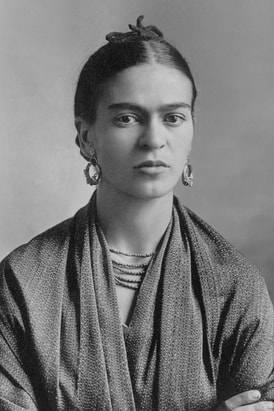|
July 6, 2021, was the 114th birth anniversary of Frida Kahlo – a revolutionary painter and socialist. Today, she has been fetishized, commodified and sanitized: her self-portraits and photographs stare out from T-shirts, calendars, fashion magazines and jewelry; her unique personality is used to sell everything – from Barbie dolls to cosmetics box sets. Kahlo’s present-day status as a global commodity masks the rich complexity of her thought. Simplistic narratives ignore the host of contradictory qualities and behaviors she represents: strength and resilience in the face of continuous physical and psychic pain; a strong political consciousness active in her daily life and paintings; devotion to her country’s many pasts, which she brought into the present; her adamant atheism combined with a desacralized use of religious imagery. Frida’s paintings are located at the constantly shifting intersections of the personal and the political, the historical and the cultural, the mythological and the ideological, the traditional and the avant-garde, the defiant and the resigned, pleasure and pain, life and death. She worked continually to create herself in her daily life and through her art, without reducing her identities to either romantic stereotypes or facile pleas for understanding. Mexican Revolution Kahlo was born in Coyoacan, Mexico City, Mexico, three years before the Mexican Revolution broke out. In 1910, a political revolution against the dictatorship of Porfirio Diaz was the spark that set in motion a deeper social revolution, in particular a peasant uprising under the leadership of Emiliano Zapata and a popular rebellion in the north led by Pancho Villa. In Baja California, the anarchist Flores Magon brothers attempted to drive forward a militant workers struggle. From the revolution to the 1940s – under the presidency of Lazaro Cardenas of the Institutional Revolutionary Party (PTI) – living standards notably improved, Mexico made great strides in economic terms and adopted an independent foreign policy. The aftermath of the Revolution also led to a period of nation-building, spearheaded by the minister of public education, José Vasconcelos – and joined by artists like Kahlo and her husband, Diego Rivera. The movement celebrated Mexico’s multi-ethnic heritage, in particular, by appropriating indigenous culture from southern Mexico for an identity that could unite all Mexicans – white, brown and mestizo into a “cosmic race.” Kahlo’s mixed heritage – her mother was Matilde Calderon, of mixed Spanish and Indian heritage, and her father Guiliermo Kahlo, a German-Jewish expatriate of Hungarian descent – allowed her to intimately relate to the cultural symbolism of the Mexican Revolution. Indigenismo became central to Kahlo’s process of self-identification, and – through her artworks and clothing – she became an iconic representative of the elements embodied in it. During her life, she dictated her birth date as July 10, 1910, the day the Mexican Revolution began. She wanted her birth and life to be indelibly bound to the revolution, which she referred to as “the one true thing to live for.” She attended rallies – though not as many as she wanted to, due to injuries from a bus crash aged 18 – to overthrow Diaz. CommunismIn 1922, Kahlo entered the National Preparatory School in Mexico City as one of 35 girls in a student body of 2,000 boys. She studied medicine and became fluent in Spanish, English and German. During her stay at the campus, she came became part of a small group called “Las Cachuchas” (The Caps) – a radical group named after the style of caps they wore in rebellion against the dress code of the period. The group read Lenin, Marx, Hegel, and Russian literature. They were known for playing pranks on conservative teachers. As a teenager, Kahlo joined the Communist Party of Mexico and in her 20s, she led union rallies with her husband. It is said that she decorated her headboard with images of Marx, Engels and Lenin. “I’m more and more convinced it’s only through communism that we can become human,” she wrote in her diary during an extended stay in New York and Detroit in the 1930s. Frida also played a role in fighting for the rights of Spanish Republican refugees seeking asylum in Mexico. In 1936, Frida, along with many other socialists, founded a committee that fundraised money for the Spanish Republicans fighting against fascism. She helped Spanish refugees in finding places to stay and ensured that they were able to secure employment. This stance is explained by her principled internationalism. Kahlo had once written: “I’m convinced of my disagreement with the counterrevolution, imperialism, fascism, religions, stupidity, capitalism, and the whole gamut of bourgeois tricks. I wish to cooperate with the Revolution in transforming the world into a classless one so that we can attain a better rhythm for the oppressed classes.” In 1954, 11 days before she died from an arterial blood clot at age 47, Kahlo marched – in a wheelchair and against her doctor’s orders – in a protest against US involvement in the coup that deposed leftist president Jacobo Árbenz Guzmán in Guatemala. At her funeral, a red flag bearing a sickle and hammer was draped over her casket. Despite her short life, Kahlo powerfully displayed the vitality of a radical commitment to humanization and egalitarianism. AuthorYanis Iqbal is an independent researcher and freelance writer based in Aligarh, India and can be contacted at [email protected]. His articles have been published in the USA, UK, Canada, Australia, New Zealand, India and several countries of Latin America. This article was republished from Counter Currents. Archives July 2021
0 Comments
Leave a Reply. |
Details
Archives
July 2024
Categories
All
|

 RSS Feed
RSS Feed